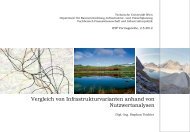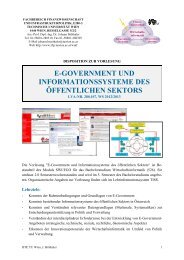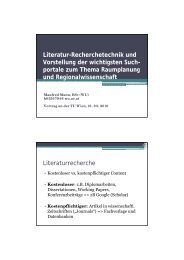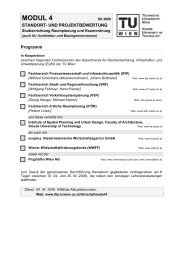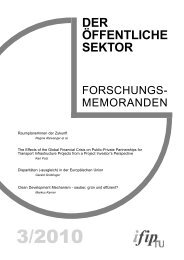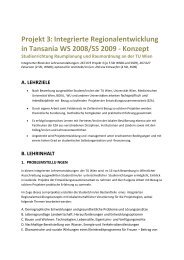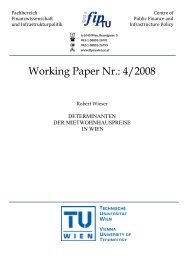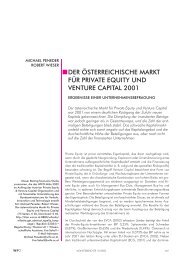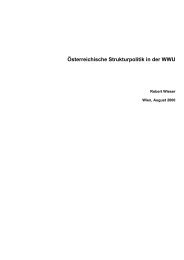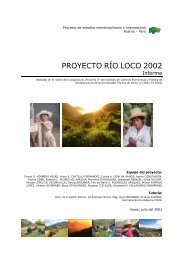Download as a PDF - CiteSeerX
Download as a PDF - CiteSeerX
Download as a PDF - CiteSeerX
Create successful ePaper yourself
Turn your PDF publications into a flip-book with our unique Google optimized e-Paper software.
expensive. One-to-one contact becomes more important <strong>as</strong> issues become<br />
more difficult or controversial, and advice becomes more complex.<br />
• One to Group: farm walks, discussion groups, technical seminars and<br />
demonstration farms are examples of ‘one to group’ activities that are being<br />
incre<strong>as</strong>ingly used, <strong>as</strong> they are more cost-effective than one-to-one sessions<br />
• Farmer clubs: the permanent group or ‘Farmer Club’ approach can encourage<br />
belonging, trust, bonding, ‘enjoyment’ and the likelihood of a closer interchange<br />
of farm experiences. A recent ‘Integrated Advice Project’ (Anon, 2004) found<br />
group spirit an important means of getting farmers to attend meetings on topics<br />
that they perceived to be less relevant to their businesses. This demonstrates a<br />
problem commonly seen, that participants have firmly held views on the relevance<br />
of topics to their business and are unwilling to readily explore wider issues,<br />
even though they might be of benefit. In the Integrated Advice Project this w<strong>as</strong><br />
particularly the c<strong>as</strong>e with the Environment module, although those that did attend<br />
these meetings found that discussions went well beyond their expectations.<br />
• Telephone: telephone contact is widely used <strong>as</strong> a supporting me<strong>as</strong>ure. Many<br />
organisations have a telephone help-line that is considered to be cost-effective<br />
<strong>as</strong> a first point of contact but often requiring use of other more direct methods to<br />
adequately meet the needs of the enquirer.<br />
• Press: the farming press is generally regarded <strong>as</strong> an important method to raise<br />
awareness of existing issues and new developments, technical, regulatory or<br />
economic. It is low cost, gets to a large audience and allows scope to repeat the<br />
same message in different ways.<br />
• Shows/events: presence at a range of national and/or regional shows and other<br />
events attended by farmers and their advisers is considered useful to raise<br />
awareness and interest, and <strong>as</strong> a means of encouraging farmers to take the next<br />
step towards implementing change on their own farm.<br />
• Demo farms: ‘one-off’ or ‘semi-permanent’ demonstration farms and farm walks<br />
allow farmers to see for themselves how practices perform at a whole farm scale.<br />
Seeing something work in practice under similar practical conditions can often<br />
give a farmer the confidence and final push to make a change on his own farm.<br />
• Conferences and ‘train the influencers’: small interactive seminars and larger<br />
conferences are regarded <strong>as</strong> a good, cost-effective training mechanisms by<br />
targeting professional advisers, the trade and some leading farmers. They are not<br />
attended by the v<strong>as</strong>t majority of farmers who will usually only benefit indirectly via<br />
their adviser, press coverage or informal contact with farmers who do attend.<br />
• Web/email: websites are usually regarded <strong>as</strong> providing static reference material<br />
(e.g. publications lists, publication downloads, contact points), and links to<br />
centralised and standard information, which might support the implementation<br />
of change once a decision in principle, h<strong>as</strong> been taken by the farmer. E-mail is<br />
a quick, cheap and effective means of responding to queries from professional<br />
advisers or for relaying new information. It is also a convenient method for sending<br />
out ‘alerts’ to notify a group of people of some change or development.<br />
• TV/Radio: these media are not commonly used. Where used, it is to raise<br />
awareness and interest in the wider rural community <strong>as</strong> well <strong>as</strong> for farmers.<br />
180





